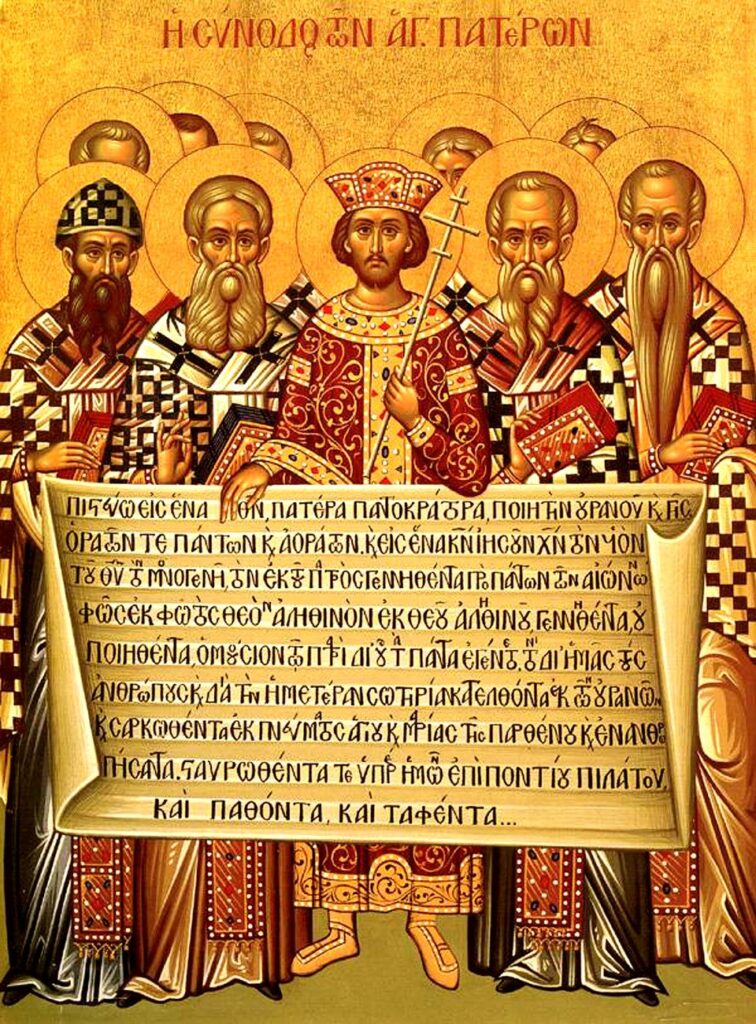
The Nicene Creed and the Only True God
In theological terms, monotheism is the belief in one God. This doctrine is affirmed by Scripture, which declares that there is one and only one living and true God. The Shema of Israel declares, “Hear, O Israel: The Lord our God, the Lord is one” (Deuteronomy 6:4). This declaration is foundational Bible truth for the people of God and is affirmed over and over. For example, Jeremiah states in Jeremiah 10:10, “But the Lord is the true God; he is the living God and the everlasting King. At his wrath the earth quakes, and the nations cannot endure his indignation.”
Early Christian creeds and statements of belief recognized the Bible’s clear teaching on this topic. One in particular is the Nicene Creed. The creed highlights monotheism, the belief in one God, and sets it within a Trinitarian structure.
The Nicene Creed begins with a clear and unequivocal statement: “We believe in one God, the Father Almighty, Maker of heaven and earth, of all things visible and invisible.” This declaration underscores the foundational Christian belief in a single, sovereign, transcendent God who is the Creator of all that exists. The use of the term “one God” affirms strict monotheism, distinguishing Christian belief from polytheism, the belief in many gods.
Many pagan spiritualities, the most popular of which is Mormonism, deny this most central tenet. Mormonism believes there are many gods – you can be a god and become a god just like all the gods before you.
In the words of Mormonism founder Joseph Smith, “Here, then is eternal life – to know the only wise and true God; and you have got to learn how to be Gods yourselves, and to be kings and priests to God, the same as all Gods have done before you” (Teachings of the Prophet Joseph Smith 346).

Likewise, Brigham Young stated, “The Lord created you and me for the purpose of becoming Gods like Himself … The Lord has organized mankind for the express purpose of increasing in that intelligence and truth, which is with God, until he is capable of creating worlds on worlds, and becoming Gods, even the sons of God” (Journal of Discourses 3:93).

Orthodox Christianity, on the other hand, draws a sharp distinction between the one true God and the creation He made.
At first glance, the Creed’s elaboration on the roles of the Son (Jesus Christ) and the Holy Spirit might seem to complicate its monotheistic claim. However, Christianity maintains that while God is three Persons – Father, Son, and Holy Spirit – there is still only one divine essence. This concept is known as the doctrine of the Trinity, not the belief in three gods but a complex unity within a single divine nature.
R. Albert Mohler, speaking of the Apostles’ Creed, rightly notes that “when the Apostles’ Creed begins with these words: ‘I believe in God, the Father Almighty,’ it immediately gets to the essential content of our faith – God’s Trinitarian nature. Without this affirmation, Christianity is incoherent – it does not hold together” (The Apostles’ Creed 5).
Likewise, the Nicene Creed, in declaring one God, immediately does so in the context of the Trinity. There is one God, the Father Almighty. The Nicene Creed goes on to declare, “We believe in one Lord, Jesus Christ, the only Son of God… of one Being with the Father.” This phrase, “of one Being with the Father” (homoousios in Greek), was inserted to affirm that Jesus is not a lesser or created being, but fully divine, sharing the same essence as God the Father. Similarly, the Holy Spirit is described as “the Lord, the giver of life, who proceeds from the Father [and the Son], who with the Father and the Son is worshiped and glorified.” This places the Spirit on equal footing with the Father and the Son in terms of divinity and worship.

Early Baptists followed suit by connecting the Biblical doctrines of monotheism and the Trinity. For example, in The Baptist Catechism of 1695 (also called Keach’s Catechism), questions eight and nine show this evangelical understanding of monotheism and trinitarianism. Question eight reads, “Q. Are there more gods than one? A. There is but one only, the living and true God.” This is followed by question nine, “Q. How many persons are there in the Godhead? A. There are three persons in the Godhead: the Father, the Son, and the Holy Spirit; and these three are one God, the same in essence, equal in power and glory.”

This is the exact pattern used by contemporary Baptists. The Baptist Faith and Message 2000 reads, “There is one and only one living and true God… The eternal triune God reveals Himself to us as Father, Son and Holy Spirit, with distinct personal attributes, but without division of nature, essence, or being” (BFM 2000 Article II).
Thus, the Nicene Creed upholds monotheism by emphasizing the unity of divine essence among the three Persons of the Trinity. It is a monotheism that is unique to Christianity — one that affirms God’s oneness while acknowledging a complex internal relationship within the Godhead.
So what? By clearly stating a Biblical monotheism, the Nicene Creed has profound implications for Christian theology and practice. It means that creation, redemption, and sanctification come from one source: the one true God. This Biblical unity provides coherence and stability to Christian belief, ensuring that all aspects of the faith, from worship to instruction, are grounded in the nature of a single, consistent divine Being.